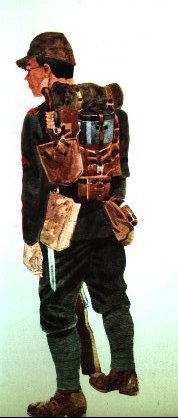 |
The Japanese soldier
He was tough and a fighter to be reckoned with, although his
basic training and weapon handling was minimal. Discipline was a number one priority. During his training any lack of discipline was punished by his superiors in the form of
beatings. Their age was between 18 years or forty and they were seldom taller
than 1.60 meters.
By the time he joined his regiment he blindly obeyed orders. From an early age it
was drilled in him and for that matter the whole Japanese population that surrender was dishonest and prisoners were tortured and killed by their enemies.
No wonder most fought until death, as with death for the emperor came glory for
ever. Being taken prisoner was less than human.
|
The Japanese soldier had three meals a day mainly 630 gram of rice supplemented with fish, meat,
vegetables and fruit. He slept on a mat on the ground. He carried during operations his ammunition
and hand grenades, rifle and bayonet, entrenching tools, a coat, two blankets, food utensils, extra
socks and underwear. On top of this 10 kg of rice and drinking water.
During the war the main problem in the Japanese army was supplies and more often than not they
had to supply their own needs.
Medical care, if at all was very basic and often the sick or dying were left on their own. Malaria,
dysentery, cholera and beriberi took many lives.
Most of the prison guards were recruited from Korean volunteers and very often the sadistic
treatment the allied prisoners had to endure was due to them.
In camp2, the "Death Camp", 5km south of Pakanbaroe, where the worst of the sick were taken
and most of them died, Korean guards sometimes pushed burning cigarettes in their face. One
popular game of them was to line prisoners up in two lines opposite each other and let them attack
each other. If this wasn't done to their liking, they used bamboo rods and rifle butts to show how it
should be done and weren't satisfied until blood flowed. The winners of these fights were given
cigarettes by the laughing guards.
In most instances the Japanese guards, who had a higher norm, didn't mistreat the prisoners
excessively.
All the above is not meant as an excuse, but more as an insight in their behaviour towards the
POW's. Why treat them as human beings when they stopped being humans when they surrendered.
Also because of their up bringing and belief's, the Japanese Army had no idea how to act or to look
after the thousands of POWs after the surrender of the Allied troops. Tokyo had never given any
guidelines to that affect.

